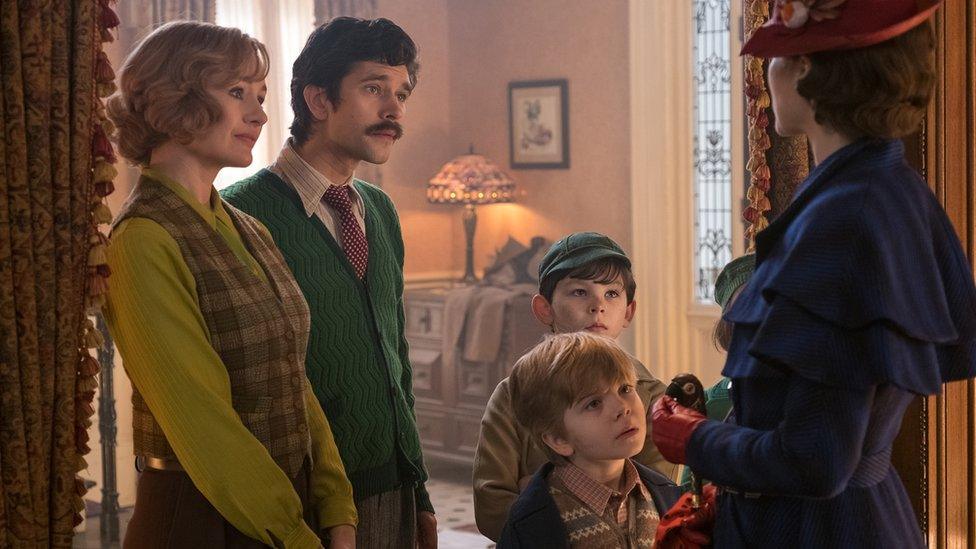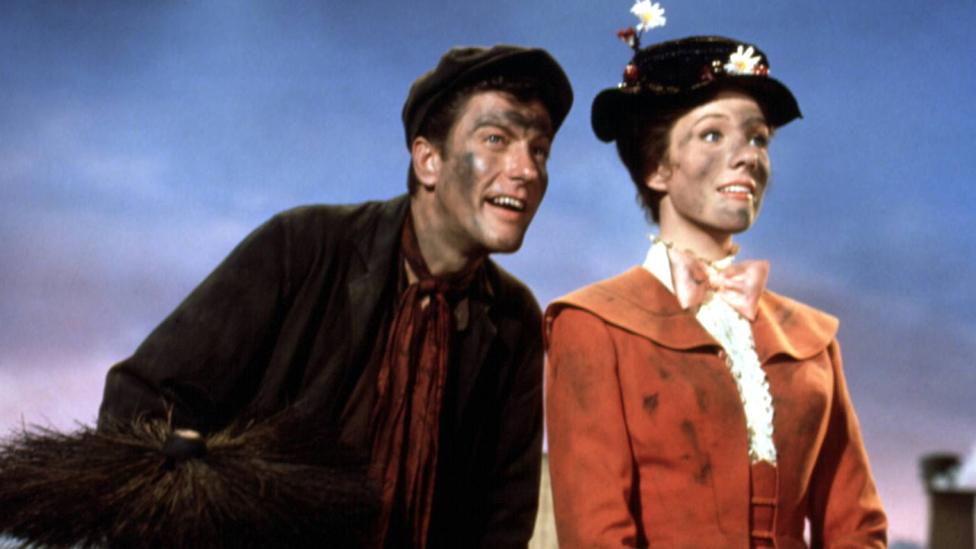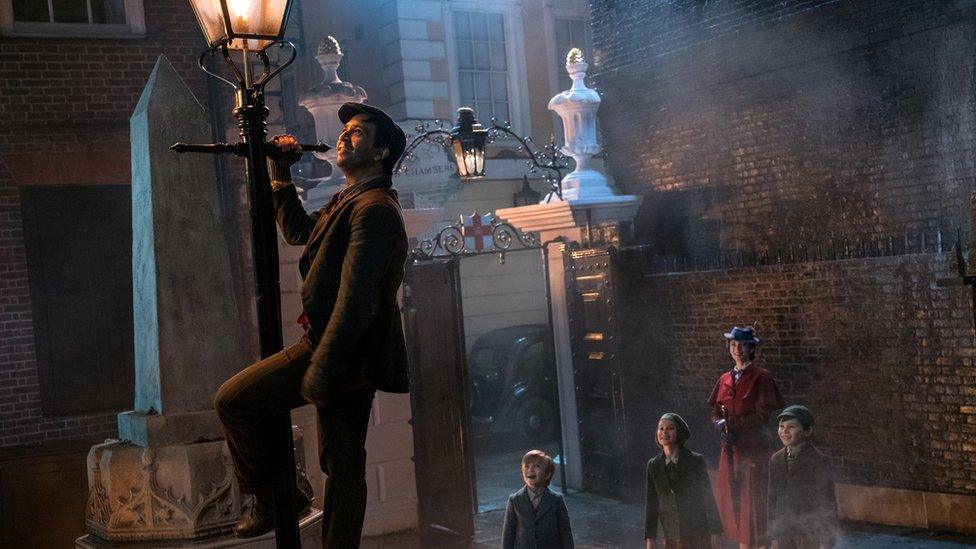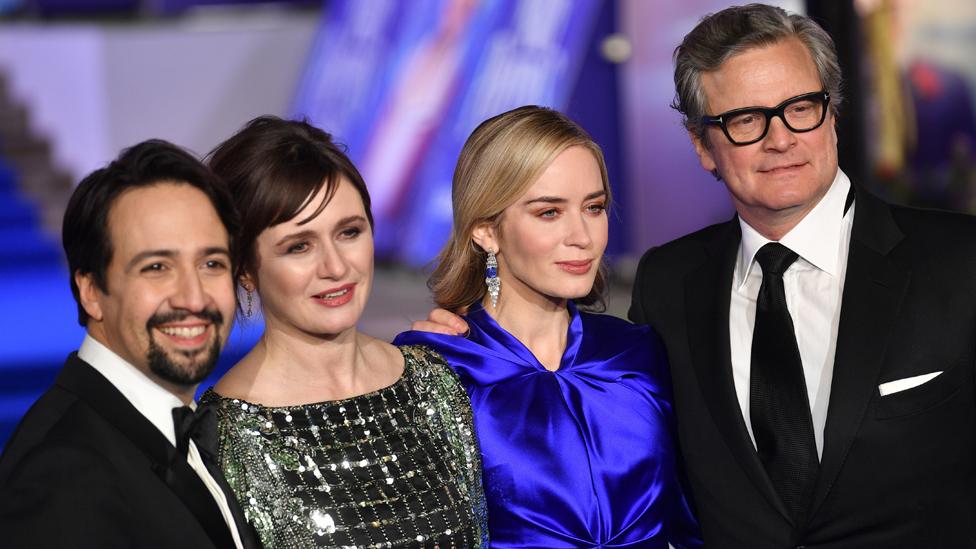Mary Poppins Returns: The story behind the soundtrack
- Published

Who would dare write the songs for Mary Poppins Returns, when the original score is considered such a classic? The writers of Hairspray, that's who.
In 1964 the film Mary Poppins was a huge hit for Walt Disney.
The songs by the brothers Robert and Richard Sherman are widely regarded as one of the best original scores ever for a screen musical.
Now Mary Poppins Returns takes us back to the Banks family decades later, with lyricist Scott Wittman teaming up with composer Marc Shaiman.
"You know the Sherman Brothers were Disney royalty," he tells BBC News.
"Robert is no longer with us, sadly. But when Richard Sherman reached 90 this year, Disney renamed their main soundstage the Sherman Stage - that's how important they've been.
"So it was a thrill that Dick sent us the most beautiful message after he saw the new film. His approval was everything to us."
Mary Poppins Returns, starring Emily Blunt and Lin-Manuel Miranda, is a sequel rather than a remake.
The songs are new - though here and there the orchestrators smuggle in references to the Sherman songs.
Shaiman and Wittman are best known for writing Hairspray and for the 2013 stage version of Charlie and the Chocolate Factory.
When they discussed the new project with director Rob Marshall, the first question was what the songs should sound like.
But Wittman says finding an idiom wasn't a huge problem.
"Rob Marshall didn't want Mary Poppins to sing something like Let It Go [from Frozen]. We agreed the music was going to live in period in Cherry Tree Lane, like in the first movie.
"The fact it was set in the Depression of the 1930s helped as well - Marc and I are fans of British popular songs of that era, like Flanagan and Allen.
"So Lin-Manuel Miranda's opening song, Lovely London Sky, has that feel. Lin put it very well: our film has to rhyme with the 1964 film."

Julie Andrews and Dick Van Dyke starred in the original 1964 film
As a writer, Lin-Manuel Miranda astonished the theatre world by telling the story of Alexander Hamilton partly through rap music. The new film gives him one song (A Cover is Not the Book) which flirts gently with the same genre.
But Shaiman thinks musical definitions are fluid.
"Before there was rap, there were things called patter songs which the Victorians knew all about and they overlap. Wittman thinks Gilbert and Sullivan were the grandfathers of rap."
The big hits of the Sherman score, like Feed the Birds and A Spoonful of Sugar, were played endlessly on the radio after their film came out - one reason why people of a certain age know the songs so well.
But in the age of streaming isn't it tough for stage and movie songs to become chart hits?
"That may be true," says Wittman, "but Marc and I write to character because we're theatre writers at heart. We would never think let's get a single out of this.
"So when we gave Lin a number with a touch of rap it's because we know audiences want to hear him perform with that speed and brilliance of his. But also it has to work for his character of Jack the lamplighter."
As collaborators, Shaiman and Wittman don't quite fit the pattern of most songwriting duos for stage and screen. It's not that one writes the music and the other does all the words.
"We write sitting in the same room and we work at the same time," says Wittman.
"Other people work differently, but with us it doesn't quite make sense to ask which comes first - the words or the music? Marc's the composer, but we do the words jointly.

Hamilton creator Lin-Manuel Miranda stars as lamp lighter Jack in the film
"So really we play word association - we'll have the book of a musical in front of us, or in this case the screenplay by David Magee. We're looking for ways into a song."
Shaiman says he used to write almost everything at the piano. "But in the last few years we've tended more to write a basic lyric before I go to the piano at all.
"Sometimes we phrase-associate for a few days and then I physically stick those phrases to the piano. And I'll see what calls out to me and what feels like it might be a melody.
"So sometimes we get a dummy song - even if the lyric is silly and maybe very rude. Then I back away from the piano and that's when Scott and I carve the lyric out - line by line, syllable by syllable, rhyme by rhyme."
Wittman volunteers that a title too can be a crucial thing. "But to answer that old question about the words or the music - what has to come first is the idea. Otherwise there's no song."
Next for Shaiman and Wittman comes a new stage show. With Matthew Lopez, writer of the current London stage hit The Inheritance, they're starting work on a new musical version of the classic Billy Wilder film Some Like it Hot.
But first, says Shaiman, they'll need to be allowed off the Poppins publicity machine.
"And it's some merry-go-round, I can tell you. For now we're playing hooky from songwriting - it will take at least two more years to get Some Like it Hot finished. Musicals take a lot of hard work."

Follow us on Facebook, external, on Twitter @BBCNewsEnts, external, or on Instagram at bbcnewsents, external. If you have a story suggestion email entertainment.news@bbc.co.uk, external.
- Published19 December 2018

- Published15 December 2018